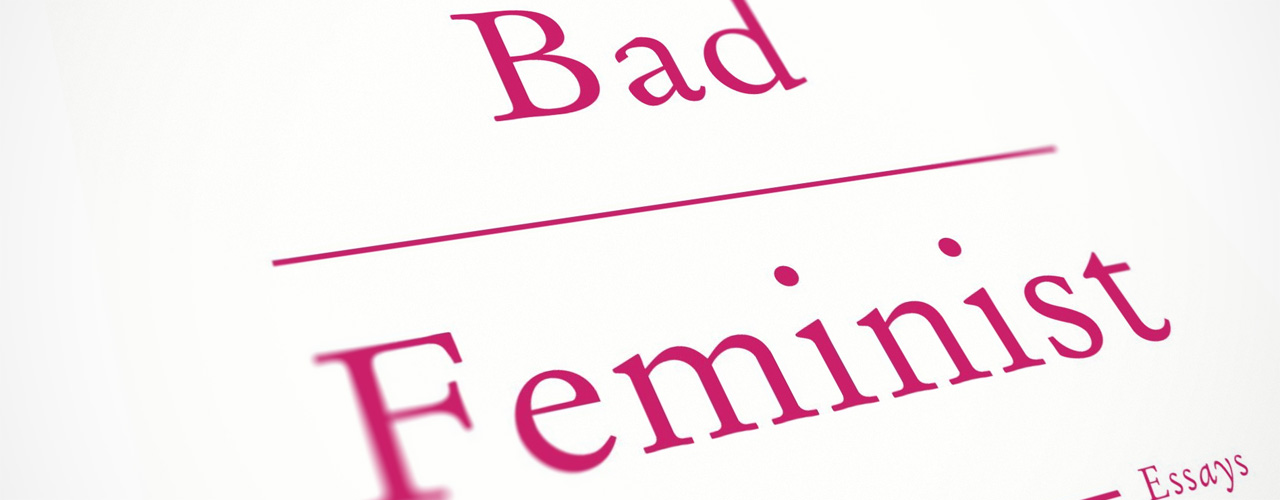
Roxane Gay’s favorite color is pink. She blasts hip hop in her car. She watches a great deal of Lifetime movies. She likes men and sex. A lot. She is also a feminist.
If one were to hold her up to the golden standard of feminism, she might not measure up. But she’s not trying to measure herself against any sort of label. She’s just trying to be herself.
Throughout this book of essays, read by Bahni Turpin, who punctuates each joke at just the right point, Gay slides easily from pop culture to politics to personal reflections. Sometimes she does all three in a single essay. She uses cultural phenomena as a springboard to talk about larger contemporary issues. In one essay she delves into the movie Bridesmaids. While admitting that she likes the movie, she hardly found it the revolution it was purported to be, because while combatting the stereotype that “women aren’t funny” it promotes many heteronormative and sizist stereotypes.
In “What We Hunger For” she uses the acclaimed Hunger Games books, which she devoured, to talk about the need for strong female role models. And she uses to this need to talk about her own experience with sexual assault as a teenager. In the most personal, most intense passage of the book, Gay opens a vein and bleeds for us, recalling the emotional details, her devotion to her attacker before the assault, and the hurls of “slut” she heard at school after. It is in such personal moments that Gay connects best with her audience, when her points are driven home better than any academic arguments ever could (though her PhD in rhetoric is apparent in each essay, if not sentence). Seeing her—bared, scarred, and messy—is to understand and accept her as human.
Gay doesn’t lay out any sort of thesis or offer any solutions in many of her essays, including in “What We Hunger For”. Rather she discusses things that mean a great deal to her and leave us to do with them what we will.
Gay gushes over Sweet Valley High, and rails against Daniel Tosh, the a comedian known for rape jokes. It is this sort of juxtaposition that leads Gay to describe herself as a bad feminist. That she can find solace in elements of pop culture while simultaneously criticizing others, or even the same elements, is disconcerting to her, and may also be for readers and critics.

But by the end of Bad Feminist, I didn’t think that Gay is, in fact, a bad feminist. I think she’s a very good feminist. To say otherwise is to either give into a stereotype of feminism that any thinking person would reject, or else to carve in stone the perfection of feminism that no earthly being could possibly aspire to.
Many of the essays in Bad Feminist concern race as well as gender. Once again she uses pop culture to talk about cultural trends, as she critiques Tyler Perry movies, and wishes for more movies like Love and Basketball, though it is no great cinematic feat. In fact, a great cinematic feat doesn’t always do it for her, especially when so many such films featuring black stories in the past several years revolve around slavery (12 Years a Slave, Django Unchained) or servitude (The Help). She wishes to see more dynamic movies concerning black people, rather than in roles of subjugation.
Beyond Hollywood, she considers the treatment of Dzhokhar Tsarnaev and Trayvon Martin in the press, the former whose light skin and tussled hair landed him on the cover of Rolling Stone, and the latter who is routinely called a thug. She also talks about the erroneous statistics that fly around, such as black men are more likely to end up in jail than go to college (there are about 600,000 more black men in college than in jail), and just how disheartening it is that such myths are so pervasive.
Some have criticized Bad Feminist for devoting so many essays to race. This is ironic, because it is exactly this sort of white-washed feminism that Gay, a black woman whose parents were born in Haiti, finds so distasteful. So much of feminism is devoted to helping white, middle-class, well-educated women, but there is no such thing as a one-size-fits-all feminism. I believe that anyone of any racial or religious background can enjoy Bad Feminist, just as I believe that not only women will take interest in this book. Anyone, men and women, gay and straight, religious and not, black, Asian, Latino, Native American, and white, can find true pleasure in Gay’s wit, her critical analysis, her personal stories, and the podcast-like nature of listening to essays in an audiobook format.
Gay never asks us to agree with everything she writes. She is, after all, only trying to be herself.
Listen to a clip about Roxane Gay’s dissecting the movie Bridesmaids.
Sign up for our newsletter to be the first to know when Bad Feminist will be available through Libro.fm. Update: It’s available now!


One thought on “Review: Bad Feminist”